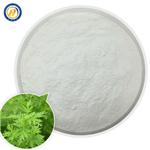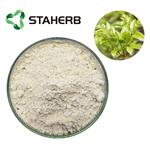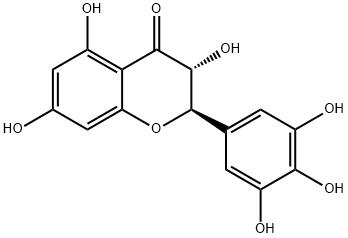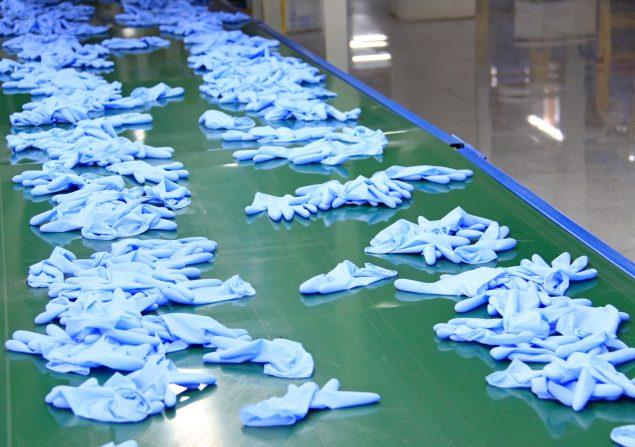What is Ampelopsin?
Hovenia dulcis has been used in traditional Japanese, Chinese, and Korean medicines to treat fever, parasitic infection, as a laxative, and a treatment of liver diseases, and as a hangover treatment. Methods have been developed to extract ampelopsin from it at large scales, and laboratory research has been conducted with the compound to see if it might be useful as a drug in any of the conditions for which the parent plant has been traditionally used.
Pharmacologic Action
Ampelopsin,a major antifungal constituent from Salix sachalinensis, isolated from the herb of Myrica rubra (Lour.) Zucc., exhibiting antioxidant, antiproliferative, anti-apoptotic, and anti-alcohol intoxication properties. Ampelopsin is a natural compound used in cosmetics material, which has hepatoprotective, anti-inflammatory,antioxidant, antitumor, anti-invasive and anti-metastatic effects. It is an effective mTOR inhibitor, it inhibited the interconnected ROS/Akt/IKK/NF-κB signaling pathways, and it inhibited H₂O₂-induced apoptosis by ERK and Akt signaling pathways and up-regulation of heme oxygenase-1.

Mechanism of Action
Dimyricetin is one of the main active components of vine tea, which has a variety of biological functions, such as free radical scavenging, anti-oxidation, anti-hypertension, anti-thrombosis, anti-tumor, anti-inflammatory and other peculiar effects. As a special kind of flavonoids, dihydromyricetin not only has the general properties of flavonoids, but also has the functions of relieving alcoholism, preventing alcoholic liver, fatty liver, inhibiting the deterioration of liver cells, and reducing the incidence of liver cancer. A good product to protect the liver and protect the liver, hangover and hangover.
Antibacterial effect
Pharmacological experiments show that dihydromyricetin has antibacterial effects on Bacillus subtilis, Staphylococcus aureus, Salmonella, Escherichia coli, Aerobacter, Saccharomyces cerevisiae, Rhododendron, Penicillium, Aspergillus niger, Aspergillus flavus, Trichoderma Both mold and Rhizopus have bacteriostatic effects, especially on Gram-positive, Gram-negative cocci or bacilli. Regulating effect on blood sugar and blood lipids: Pharmacological experiments of mouse gavage show that dihydromyricetin can significantly inhibit the rise of blood sugar in mice induced by alloxan, epinephrine, streptozotocin, etc., and at the same time increase serum insulin levels, The infiltration of lymphocytes in pancreatic tissue was significantly reduced, the inflammatory response was significantly alleviated, and the number of pancreatic islets was significantly increased. Dihydromyricetin can reduce serum triacylglycerol (TG) content in streptozotocin-induced hyperglycemia rats, but has no significant effect on serum total cholesterol (TC) and high-density lipoprotein cholesterol (HDL2C) content.
Hepatoprotective effect
Dihydromyricetin has significant protective effect on rat hepatocytes from carbon tetrachloride poisoning injury, D2 galactosamine and lipopolysaccharide-induced liver injury in mice. Dihydromyricetin can protect the liver, accelerate the rapid decomposition of ethanol metabolite acetaldehyde, turn it into a non-toxic substance, and reduce its damage to liver cells. In addition, dihydromyricetin can improve the increase of serum lactate dehydrogenase activity caused by liver cell injury, inhibit the formation of collagen fibers in hepatic M cells, so as to protect the liver and protect the liver, and greatly reduce the damage of ethanol to the liver. The normal state of the liver can be quickly restored. Microherb test proved that dihydromyricetin can protect the liver, accelerate the rapid decomposition of acetaldehyde, a metabolite of ethanol, into non-toxic substances, and reduce damage to liver cells. Dihydromyricetin has a rapid onset and long-lasting effect.
Antioxidative effect
Dihydromyricetin with a purity of 98% can significantly inhibit the formation of malondialdehyde (MDA) in rat myocardial, liver and brain tissue homogenates, and inhibit the formation of MDA with the increase of dihydromyricetin concentration. The effect is increased, and the scavenging rate of diphenyltrinitrophenylhydrazine (DPPH) free radicals in the test system with 99% dihydromyricetin. Dihydromyricetin can significantly inhibit the formation of MDA in oil, and the antioxidant effect is enhanced with the increase of dihydromyricetin purity (60%-90%); it has strong antioxidant effect on animal and vegetable oils.
Anti-tumor effect
In recent years, anti-tumor pharmacodynamics studies have found that one of its active ingredients, the small molecule compound of rhodopsin, has a relatively strong anti-cancer effect. In vitro and in vivo anti-tumor studies have found that the compound can improve tumor treatment effects and improve patients' vital symptoms by inhibiting tumor blood vessel growth, regulating and enhancing cellular immune function, etc. showed significant tumor suppressor effect.
Research
In a trial of 60 patients with "nonalcoholic fatty liver disease," dihydromyricetin improved glucose and lipid metabolism and yielded potentially beneficial anti-inflammatory effects.
In a study wherein the subjects were rats, researchers demonstrated "pharmacological properties of dihydromyricetin consistent with those expected to underlie successful medical treatment of alcohol use disorders; therefore dihydromyricetin is a therapeutic candidate."
As they pertain to dihydromyricetin, additional research is required before claims of human efficacy and application, necessary dosage, and solutions to poor bioavailability, are met with scientific validation.
You may like
Related articles And Qustion
See also
Lastest Price from Dihydromyricetin manufacturers

US $0.00-0.00/kg2024-04-30
- CAS:
- 27200-12-0
- Min. Order:
- 20kg
- Purity:
- 99%
- Supply Ability:
- 200000

US $0.00-0.00/kg2024-04-28
- CAS:
- 27200-12-0
- Min. Order:
- 1kg
- Purity:
- 1%-98% HPLC
- Supply Ability:
- 1000kg


